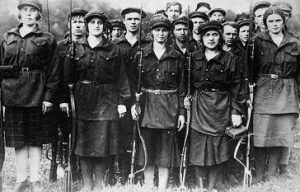Bolshevik Women: Revolutionary Communist Leaders
The El Salvador article in the last Red Flag makes an important point. Too often we think that “leadership” means chairing meetings, giving speeches, writing pamphlets. These are tasks that men (especially male intellectuals) are more likely to have been trained to take on. Too often we don’t see the important work done by women (and lesser-known men) as real leadership.
For example, Lenin is described as “the leader” of the 1917 Bolshevik revolution, while his communist wife Krupskaia “helped” him. She did a lot more than that.
While in exile, Krupskaia received visiting comrades, established connections, gave instructions. She decoded incoming letters, read then and answered them in code. She memorized comrades’ aliases and addresses and managed Party finances.
In 1917, Krupskaia chose to become an organizer in the critical Vyborg working-class district of Petrograd. She worked mainly with youth and women, and was elected to the Vyborg duma (council).
Lenin’s sister Anna joined the Party in 1898 and helped publish underground Bolshevik newspapers. Their sister Mariia organized circles of railway workers. During World War I she trained as a nurse so she could go organize soldiers at the front. Meanwhile she kept “safe houses” and organized meetings with visiting comrades.
Vera Slutskaia, daughter of a skilled worker, organized women in Vyborg, where she gave leadership on a local level. She was killed defending the October Revolution as the Bolsheviks took power.
Petronelia Zinchenko worked on the docks, in the fields and in the factories. She joined the party in 1917, organized sailors and women workers in Kronstadt, and served on the Kronstadt Soviet.
E. Alekseeva started working in a textile factory at age 10 and became a Bolshevik at 14. She took part in strikes, distributed Party literature, collected money and got fired. She found work in a metal factory and started organizing there.
After the revolution, Alekseeva (like many other Bolshevik women) worked as a party cadre. Yet her official Soviet biography described the “high point” of her life as serving as lookout and making tea at the October meeting that planned the insurrection.
There were literally hundreds of these Bolshevik women. They, and many men who did similar work, are described as “rank-and-file Bolsheviks.” But they were the ones who mobilized the masses. They were real leaders.
So, while it’s important to support and encourage women to give speeches and so forth, the fight against sexism within our movement shouldn’t be focused on getting communist women to be more like men. We must learn to recognize, respect and learn from the leadership that women (as well as men) already give.
We must fight the idea that only a “select few” are “real leaders.” Hundreds, thousands, millions of workers and youth can and must become communist leaders.
—Red History Student

Bolshevik Women Give Leadership in the October 1917 Revolution
Lunchroom Conversation
Once again, my co-worker and I were watching the news during lunch time when the news broke about something else Donald Trump had said regarding his travel ban.
“It’s all bullsh*t,” José said. “He’s against us—you know—blacks and browns. All he wants to do is take care of the whites.”
José and I are always the ones who spark political conversations or even turn to the news, mostly because of everyone’s understandable distaste for Trump’s policies and latest attention-grabbing antics.
I quickly interjected and said, “But there are poor whites as well as rich blacks and Latinos,” which made him and the other workers in the lunch room start to pay attention.
“What you mean, Demetrius?” José said to me when I started to explain that separating people by race has always been on the capitalist agenda and it’s only worsened (if you can say that) with the election of Donald Trump.
“There are poor whites who have fears like us, living in poverty. We’re all just working day in and day out to make ends meet,” I said, which made José start to nod his head.
“Yeah, but whites are what got him into office!” answered José.
This lead me to explain that the two years of building up propaganda and fear in white workers about immigrants and competition for jobs in this capitalist society are what helped him win.
José seemed to understand what I was saying but just couldn’t seem to stop asking questions regarding why he is still in office when he’s offending so many people.
After a little more back and forth over race, I asked him if he would like to read Red Flag, which helps give me a better understanding of how capitalism works, and he agreed.
“I can’t wait to read it,” José said with excitement. And I can’t wait for the conversation that we are eventually going to have after he reads it.
—Young Industrial Worker
Give the People What They Want
While sitting on a city park bench, I recently spoke to a young woman who was passing out information on an upcoming Christian evangelical meeting. She wished to invite me to the meeting. However, I politely declined as I am not a believer. The young woman persisted and began to tell me of the joys and benefits of being a Christian. She insisted that the church is the only way to lift myself out of loneliness, financial stress, and unfulfilled goals. In her view, I should also continuously give thanks to her god for allowing me to live each day.
I informed the woman that I am not lonely; that my finances are not a particular stressor at present; and that I have indeed fulfilled most of my personal life goals. She asked me how that could be true given that I was all alone on a park bench, my clothes were simple and worn, and I am not in touch with her god anyway. I said that I, for one, do not need a god to live fully by my own standards. I added that I do not live in fear of dying tomorrow, as I live fully each day. None of my perspective mattered to the young woman. In her view, I must be an unhappy person so that her god can save me!
The communist view is similarly challenged in its claim of working for the liberation of the masses. There are certain truths that undermine communisms’ effectiveness in tackling the real difficulties of organizing really massive societies populated by different peoples. The communist movement appears to want to preserve the ideas of its early thinkers. Yet psychologically/mentally impactful experiences in individuals and sociopolitical happenings continually transform these big societies. What may have worked even a short half-century ago is not necessarily practical or relevant in the present day.
For example, communism starts from the view that citizens of the world are suffering under capitalist oppression and social maladjustment. The solution to this is the communist revolution. But what of the majority non-Western peoples on whom this system would be imposed? How does a communist convince them to adopt yet another Western social philosophy when these have historically proven to really only serve a few people in the West?
Before and through the 20th century, the world has suffered numerous struggles against colonialism/racism, social injustice and human rights violations. In addition, the Western hegemony’s emphasis on individualism has meant that societies have changed dramatically within living memory. Today many people agree that true freedom means self-determination. Each adult human must be assumed to know and must be allowed to act according to her own best interests – even to her own detriment. That is what freedom means!
—a reader
Mobilize the People for Communism
“Communism starts with a view that citizens of the world are suffering under capitalist oppression and social maladjustment. The solution to this is communist revolution.”
Indeed, the majority of the citizens of the world are suffering. Unless the victims of this suffering can stand up and fight the perpetrators of such ills (capitalist or capitalism), their suffering will never stop no matter how many reforms we try or even by mother of all reform, i.e. socialism.
Yes, communism assumes that the only way that we can be liberated is through communist revolution by the working class and after such revolution establish communism. Communism is a system where production is for the whole society. Everyone will contribute based on how much he/she can according to one’s ability. No one will be privileged. This is not automatic. It needs a struggle.
It is true that most of the world is influenced by what is historically regarded as western thought. It is only partly true that communism is a western philosophy. Even though many influential communist writers come from the West, some of its principles have non-western elements.
A comrade said, “I was born here in South Africa in a village where people lived in some collective way. The village under the king provided land to everyone or every family to build houses and grow crops mostly maize, beans, sugar canes and butternuts etc. Not everyone or family had cows and a plough but everyone’s farm would be ploughed by strong cows and men of the village.
“To plough was mostly a men’s job. Women’s work was to care of the young crops and guard against weeds for a sustained period of time until they could grow smoothly. During the harvest time, women (mostly with children) would harvest. Men would transport the products to the village by cows so that it could be shared amongst the village according to one’s farm.
“This collective system of living was not perfect. It was sexist at times and had some privileged individuals, like the King and his close relatives.”
To an extent this was fulfilling because most of the time the needs of the people were met. They had healthy food to eat, water to drink and less health care problems. This shows that a collective way of living is fulfilling to most of the people.
Yes, some people may want to revert back to such systems or to similar ways of living. But a communist goal is break the limits of such pre-capitalist systems, to achieve a way of living that is even better.
—Comrades in South Africa

Taking on the fascists in Southeast Los Angeles County

CUDAHY, U.S. —Liberal mayors across the U.S. have declared their cities to be “Sanctuary Cities.” Such cities would limit their cooperation with the national government’s efforts to enforce racist immigration laws.
Tiny Cudahy is such a city. Trump supporters showed up at the regular city council meeting demanding that the city change its status. Before the meeting, shouting matches erupted outside between Trump supporters and anti-Trump protestors. Residents who came out of their houses and motorists driving by wanted to know what was going on.
Comrades explained the situation to them as we offered them Red Flag. Mostly everyone was angry at the racists and willingly took the paper. We explained to them that the ICWP is fighting for communism: a world in which we workers do not have to live in fear of deportations because we won’t be forced to flee from one place to another in search of a better life. Wherever we live we will live in a communist manner; no money, no borders and no capitalist government.
At one point a small group of young people were shouting obscenities at the racist-fascists. We approached them and said that the only way to stop these racist-fascists was with organized violence of youth and workers. What we need is to organize for communist revolution so that once and for all we can do away with these racist-fascists. All of these youth also took Red Flag.
All together we distributed well over two hundred Red Flag newspapers, mainly to residents and motorists. Many expressed gratitude for us being there. We are planning to bring this issue of Red Flag to the neighborhood soon.

Hamburg Germany, July 7: Thousands of people take to the streets for major anti-capitalist protest march during #G20 summit in Germany. Hundreds of thousands around the world are fed up with capitalism, its wars, racism, exploitation and destruction of the environment. In spite of the sign “Game Over Capitalism” above, the game won’t be over, however, until we mobilize the masses for communism.
Front page of this issue

